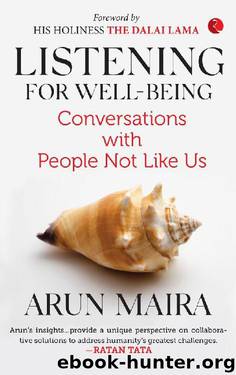Listening for Well-Being by Arun Maira

Author:Arun Maira [Maira, Arun]
Language: eng
Format: epub
Tags: Mobilism
Publisher: Rupa Publications
Published: 2017-08-02T00:00:00+00:00
EPISTEMIC LENSES
As we continue our exploration underwater of the lenses we wear and the stereotypes of others in the backs of our minds, there are some parts of the discussion that may appear to be academic. Indeed, they are about academics!
Three decades before Samuel Huntington wrote The Clash of Civilizations, British scientist and novelist C.P. Snow wrote The Two Cultures and the Scientific Revolution. In 2008, the Times Literary Supplement included The Two Cultures and the Scientific Revolution in its list of the 100 books that most influenced Western public discourse since the Second World War. Snow’s thesis was that the intellectual life of the whole of Western society was split into two cultures—namely the sciences and the humanities—and that this was a major hindrance to solving the world’s problems.
Snow’s position can be summed up by an often-repeated part of his essay:
A good many times I have been present at gatherings of people who, by the standards of the traditional culture, are thought highly educated and who have with considerable gusto been expressing their incredulity at the illiteracy of scientists. Once or twice I have been provoked and have asked the company how many of them could describe the Second Law of Thermodynamics. The response was cold; it was also negative. Yet I was asking something which is the scientific equivalent of: Have you read a work of Shakespeare’s? I now believe that if I had asked an even simpler question—such as, What do you mean by mass, or acceleration, which is the scientific equivalent of saying, Can you read?—not more than one in ten of the highly educated would have felt that I was speaking the same language. So the great edifice of modern physics goes up, and the majority of the cleverest people in the western world have about as much insight into it as their Neolithic ancestors would have had.17
Epistemology is the branch of philosophy that investigates methods of acquiring knowledge. It examines how we know what we know, and how we know that it is the truth. Snow pointed out the two different ways in which Western people were being ‘educated’. One set made sense of the world through the art and stories of playwrights, poets and philosophers. The other set made sense of the world through the experiments and theories of scientists. The different types of education give these persons, who are racially and culturally the same, different ‘epistemic’ lenses through which they see the world. And, just like Rudyard Kipling said ‘the West is West and the East is East and never the twain shall meet’, Snow said these two sets of people could not see eye to eye.
Download
This site does not store any files on its server. We only index and link to content provided by other sites. Please contact the content providers to delete copyright contents if any and email us, we'll remove relevant links or contents immediately.
The Rules Do Not Apply by Ariel Levy(4945)
Bluets by Maggie Nelson(4535)
Too Much and Not the Mood by Durga Chew-Bose(4321)
Pre-Suasion: A Revolutionary Way to Influence and Persuade by Robert Cialdini(4198)
The Motorcycle Diaries by Ernesto Che Guevara(4075)
Walking by Henry David Thoreau(3941)
Schaum's Quick Guide to Writing Great Short Stories by Margaret Lucke(3366)
What If This Were Enough? by Heather Havrilesky(3298)
The Daily Stoic by Holiday Ryan & Hanselman Stephen(3287)
The Day I Stopped Drinking Milk by Sudha Murty(3183)
The Social Psychology of Inequality by Unknown(3010)
Why I Write by George Orwell(2935)
Letters From a Stoic by Seneca(2779)
A Short History of Nearly Everything by Bryson Bill(2678)
A Burst of Light by Audre Lorde(2583)
Insomniac City by Bill Hayes(2535)
Feel Free by Zadie Smith(2469)
Upstream by Mary Oliver(2380)
Miami by Joan Didion(2356)
